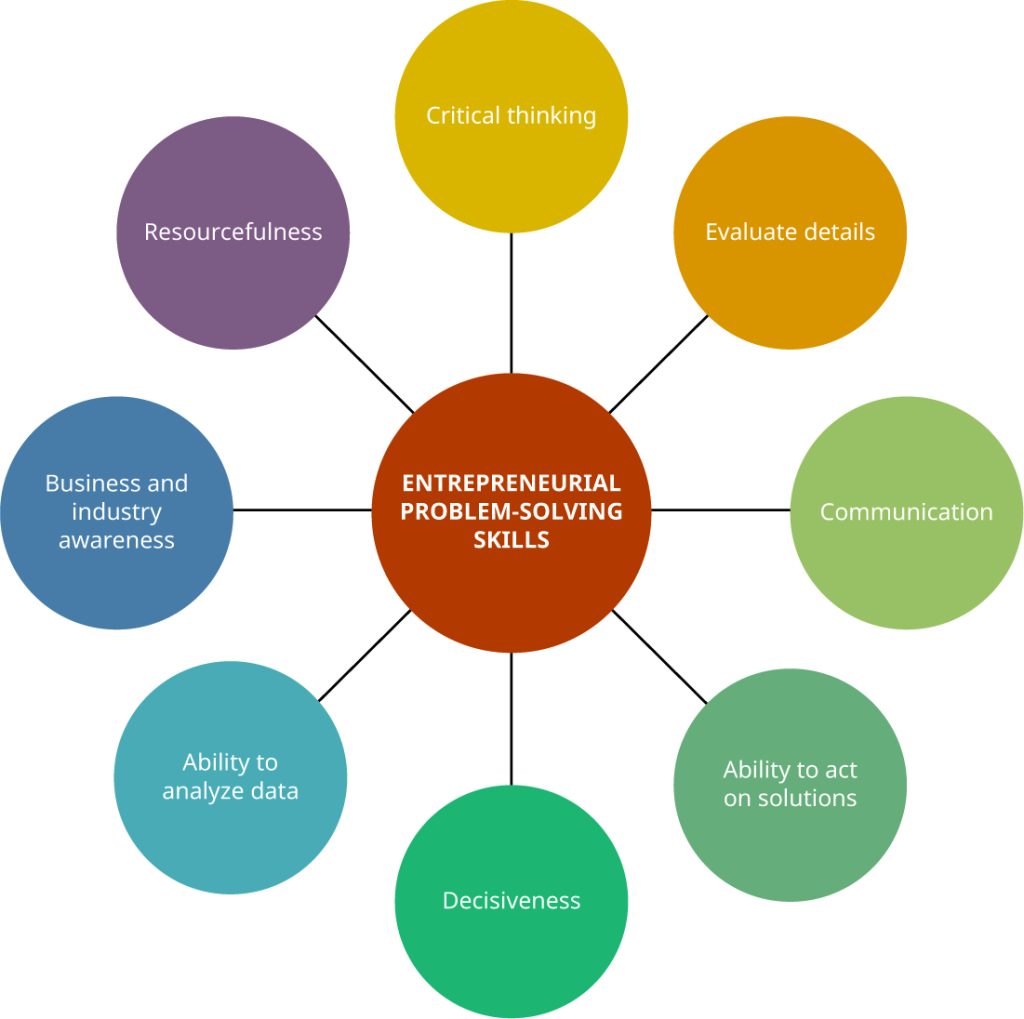Entrepreneur Problem Solving: Key Strategies for Overcoming Business Challenges
As an entrepreneur, you are bound to face a variety of challenges. From financial hurdles to employee management, the road to success is never smooth. Entrepreneur problem solving is a critical skill that can help you navigate these challenges and keep your business on track. In this article, we’ll explore effective problem-solving strategies, how to approach problems from different angles, and tips for overcoming the most common obstacles that entrepreneurs encounter.

The Importance of Problem Solving for Entrepreneurs
As a business owner, you are the primary decision-maker. Your ability to solve problems directly impacts your company’s success. Whether you’re dealing with customer complaints, cash flow issues, or operational inefficiencies, your approach to solving problems will determine how effectively you can respond and adapt.
Effective problem-solving helps entrepreneurs:
-
Make better decisions: With clear, structured thinking, you’re more likely to choose the right course of action.
-
Improve business operations: Identifying and addressing inefficiencies can save time, money, and resources.
-
Increase resilience: Overcoming obstacles helps build confidence, making you more prepared for future challenges.
Understanding the Problem-Solving Process
Problem-solving involves more than just identifying issues—it’s about applying a strategic approach to find solutions. Let’s break down the process into manageable steps:
1. Identify the Problem
The first step in entrepreneur problem solving is recognizing and clearly defining the problem. Often, problems aren’t as straightforward as they seem on the surface, so it’s essential to dig deeper and identify the root cause. By pinpointing the core issue, you can avoid wasting time and resources on symptoms rather than the actual problem.
2. Gather Information
Once you’ve identified the problem, it’s time to gather all relevant information. Understand the full context of the situation, including:
-
Data: Look for trends or patterns in your business that may contribute to the issue.
-
Feedback: Collect insights from your team, customers, or partners who might provide different perspectives.
-
Resources: Determine what resources you have at your disposal to solve the problem.
3. Generate Potential Solutions
With all the necessary information, start brainstorming potential solutions. It’s important to think creatively and not settle for the first idea that comes to mind. Consider multiple solutions, including unconventional ones, to see if there’s a more effective way to tackle the problem.
4. Evaluate the Solutions
Not all solutions will work for every situation, so you need to evaluate the pros and cons of each option. Consider:
-
Feasibility: Can you implement the solution with the resources you have?
-
Impact: Will the solution address the core problem, or just treat the symptoms?
-
Time and cost: How long will it take, and how much will it cost to implement?
5. Implement the Best Solution
Once you’ve chosen the best solution, it’s time to take action. Implement your solution systematically, and ensure that everyone involved understands their roles and responsibilities. Stay flexible and be ready to make adjustments as needed.
6. Monitor and Evaluate
After implementation, it’s important to track the results. Has the problem been resolved? Are there any unforeseen side effects? By continuously monitoring and evaluating, you can ensure that your solution is working and make improvements if necessary.
Common Entrepreneur Challenges and Solutions
1. Financial Problems
One of the most common challenges entrepreneurs face is managing cash flow. Late payments, rising costs, or poor budgeting can quickly put a strain on your business. Here are some solutions to consider:
-
Budgeting and forecasting: Regularly review your financials and create forecasts to stay on track.
-
Diversify revenue streams: Don’t rely on just one income source. Look for ways to expand your offerings.
-
Seek external funding: If necessary, consider loans, venture capital, or crowdfunding to boost cash flow.
2. Team Management
Managing a team can be a major hurdle, especially if there are communication issues, low morale, or lack of direction. To solve these problems:
-
Clarify roles and expectations: Ensure that each team member understands their responsibilities and how their work contributes to the business.
-
Promote open communication: Create an environment where employees feel comfortable sharing ideas and concerns.
-
Invest in leadership: Strong leadership can inspire your team and help them stay motivated and productive.
3. Marketing Challenges
Startups often struggle with marketing their products or services effectively. It’s crucial to reach your target audience and get the word out about your business. Solutions include:
-
Leverage digital marketing: Focus on social media, SEO, and email campaigns to reach your audience where they are.
-
Collaborate with influencers: Partnering with industry influencers can help boost your brand visibility.
-
Test and iterate: Try different marketing strategies and track their performance. Be ready to adjust your tactics based on what works best.
4. Customer Acquisition and Retention
Acquiring and retaining customers is crucial for long-term business growth. Here’s how to approach it:
-
Offer exceptional customer service: Go above and beyond to make your customers feel valued.
-
Use customer feedback: Regularly ask for feedback to understand what your customers need and how you can improve.
-
Create loyalty programs: Incentivize repeat customers with discounts, rewards, or exclusive offers.
5. Time Management
Entrepreneurs often wear many hats and struggle with balancing their time between different business functions. Here are some time-management tips:
-
Prioritize tasks: Use tools like the Eisenhower Matrix to identify urgent and important tasks.
-
Delegate: Don’t try to do everything yourself. Hire the right people to handle specific tasks.
-
Use productivity tools: Leverage project management tools, like Trello or Asana, to stay organized.

Key Problem-Solving Skills for Entrepreneurs
Successful entrepreneurs often possess key problem-solving skills that allow them to tackle challenges effectively. These include:
-
Critical thinking: The ability to analyze and evaluate information to make informed decisions.
-
Adaptability: Being open to new ideas and adjusting strategies when necessary.
-
Resilience: The strength to bounce back from setbacks and keep moving forward.
-
Creativity: Thinking outside the box and finding innovative solutions to problems.
FAQs About Entrepreneur Problem Solving
1. How can I improve my problem-solving skills as an entrepreneur?
To improve your problem-solving skills, practice analyzing different types of problems, think critically about possible solutions, and constantly seek feedback from others. Learning from past experiences and embracing challenges will also help you grow as a problem solver.
2. What are some common mistakes entrepreneurs make when solving problems?
One common mistake is focusing too much on short-term fixes rather than addressing the root cause of the problem. Entrepreneurs may also ignore feedback or fail to evaluate the feasibility of solutions properly. It’s essential to take a step back and assess the bigger picture.
3. How can I motivate my team during challenging times?
During difficult times, open communication is key. Be transparent about the situation and involve your team in finding solutions. Providing encouragement, acknowledging their hard work, and offering rewards or incentives can also keep morale high.
4. How do I know when it’s time to pivot my business?
If you’re consistently facing the same challenges despite making changes, it may be time to consider a pivot. Signs that it might be time to pivot include stagnant growth, a lack of customer engagement, or declining sales. It’s important to assess the market and decide if a new direction is necessary.
Conclusion
Entrepreneur problem solving is not just about fixing immediate issues—it’s about developing a mindset that continuously seeks solutions. By following a structured approach to problem-solving, you can navigate the complexities of business ownership with confidence and resilience. Remember, challenges are inevitable, but with the right strategies in place, you can turn obstacles into opportunities for growth.
Keep honing your problem-solving skills, stay focused on your goals, and never hesitate to seek advice when needed. The road to success is paved with problem-solving, and as an entrepreneur, mastering this skill will take your business to new heights.








